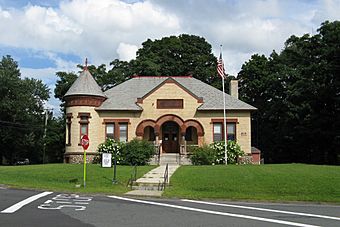Granville Village Historic District facts for kids
Quick facts for kids |
|
|
Granville Village Historic District
|
|

Granville Public Library
|
|
| Location | Roughly, area around the junction of Maple St. and Main and Granby Rds., including part of Water St., Granville, Massachusetts |
|---|---|
| Area | 59 acres (24 ha) |
| Architectural style | Greek Revival, Georgian, Federal |
| NRHP reference No. | 91001588 |
| Added to NRHP | November 5, 1991 |
The Granville Village Historic District is a special area in Granville, Massachusetts. It's like a time capsule! This district protects old buildings and places that show how the village grew. It was once a busy industrial village, famous for making drums. The district has many old houses, especially those built in the Greek Revival style. You can also find the beautiful public library building here. This historic area was added to the National Register of Historic Places in 1991.
History of Granville Village
Granville was first settled way back in 1734. At first, most of the action was in a different part of town called Granville Center. But over time, East Granville, which is now Granville Village, also started to grow. It had a tavern and some mills.
The Famous Drum Factory
In 1790, the First Baptist Church was built in the village. By the mid-1800s, Granville Village became known for one main thing: making drums! The company Noble & Cooley was started in 1854. They still make drums today in their old 19th-century factory buildings on Water Street. The success of this drum company helped the village grow a lot in the late 1800s. It is still an important business for the town.
Village Layout and Buildings
The historic district is mostly found around where Main Road (Massachusetts Route 57) and Granby Road meet. It also stretches along Water Street to the southwest, where the old factories are. The triangular green area in the middle of the village was created in the early 1900s. This happened after a hotel burned down there.
Most of the buildings in the village were built between 1830 and 1890. You'll see many Victorian and Colonial Revival style buildings. The most fancy building is the library. It's a brick building built in 1901 in the Romanesque Revival style.



